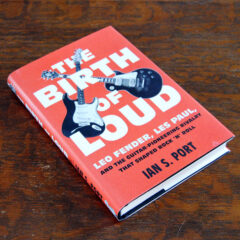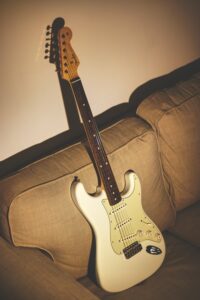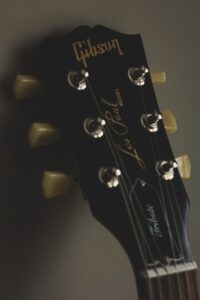
What we know of as rock n roll, is not only the story of music but the history of instruments as well. The Birth of Loud chronicles a rivalry that was at the center of more than one musical movement and it is superbly written by Ian S. Port who not only describes the people and their instruments, the trials and innovation, but the feelings of change and moments of inspiration.
Author Ian S. Port writes this book not only with great prose, but there’s some poetry in there too. His description of Hendrix at Woodstock performing the Star-Spangled Banner is the best I have ever read and the closest words have ever come to capturing the performance.
Additionally, the way he describes the electric guitar and in general electric instruments and how they “gave individual musicians a vast new sonic palette–and volume level–with which to express themselves.”
But it is his understanding and vision of the meaning of what Fenders and Les Pauls meant to the world and each other, which is the true poetry and symmetry of this entire book; “Fenders and Les Pauls were twins, opposites, companions–rivals that were remarkably complementary. Through the odd meanderings of time and fashion and technology, two musical instruments born largely in 1940s Hollywood had risen to become the cherished tools of an unfathomably louder age. The guitars of Leo and Les have far outlived the dreams of their makers–and yet, to the current generation of players, and to future ones, they were just being born.”
 For musicians, the idea of the guitars featured in this book may be of a personal preference, but for the music fan, it can be about personal taste or just plain popular culture. Sure most of the book takes place and tells the stories and evolutions of the electric guitar and its infancy, but it also happens mainly before Hendrix performs the Star-Spangled Banner at Woodstock in 69.
For musicians, the idea of the guitars featured in this book may be of a personal preference, but for the music fan, it can be about personal taste or just plain popular culture. Sure most of the book takes place and tells the stories and evolutions of the electric guitar and its infancy, but it also happens mainly before Hendrix performs the Star-Spangled Banner at Woodstock in 69.
Because of this, if you think about those two guitars today, many of the players of the recent past will come to mind but aren’t mentioned in the book. For the Fender Stratocaster that could be Kurt Cobain, Mark Knopfler, Yngwie Malmsteen, or Kenny Wayne Shepherd, for Les Paul that could be Slash, Ace Frehley, or Zakk Wylde, but the reason that those guitarists chose their selected axes, the reason you picture them with the axes they are synonymous with, that’s in this book.
Now, today many artists that come to my mind play both, or either, or whatever gives them the sound they want. But it wasn’t always the case, and in the early eras described in this book, a lot of the younger players followed the sound, and in the era before more pedals and digital processing than you could shake a stick at, you heard a sound you liked and looked at what they were using.
When the Beatles broke into America, it was a huge boom for Rickenbacker, when Clapton burst onto the scene it was a boon for Gibson Les Pauls, and boom later for Fender when he chose to play a Stratocaster, and the Beach Boys helped Fender surf high.
 All of this is covered and more, but for me, it captures something more than the history of Rock ‘N’ Roll. I own a Fender Squire Stratocaster. I once owned a fake Fender Precision Bass and I still have my Fender Jazz Bass. I have played a Gibson Les Paul, Fender Telecaster, and a real Fender Stratocaster. I understand the contours of the Strat and weight of the Les Paul as described in the book.
All of this is covered and more, but for me, it captures something more than the history of Rock ‘N’ Roll. I own a Fender Squire Stratocaster. I once owned a fake Fender Precision Bass and I still have my Fender Jazz Bass. I have played a Gibson Les Paul, Fender Telecaster, and a real Fender Stratocaster. I understand the contours of the Strat and weight of the Les Paul as described in the book.
But you don’t need personal experience to understand these things. Actually, the physicality of the instruments is the only thing non-players won’t have first-hand knowledge of, because Port does such an amazing job translating the sounds and the sonic innovations of these instruments to the page that you don’t have to even ask your digital assistant to play the song he’s talking about, but it doesn’t hurt.
Many of the songs you’ll already know by heart, but some may be more obscure. But it’s a great read, and a must for bass players, because well, Port doesn’t mess around with just the guitars, he also chronicles Fenders completely innovative electric bass that also changed the sonic legacy of music as we know it.
Read the Secret File of technical information and quotes from The Birth of Loud.